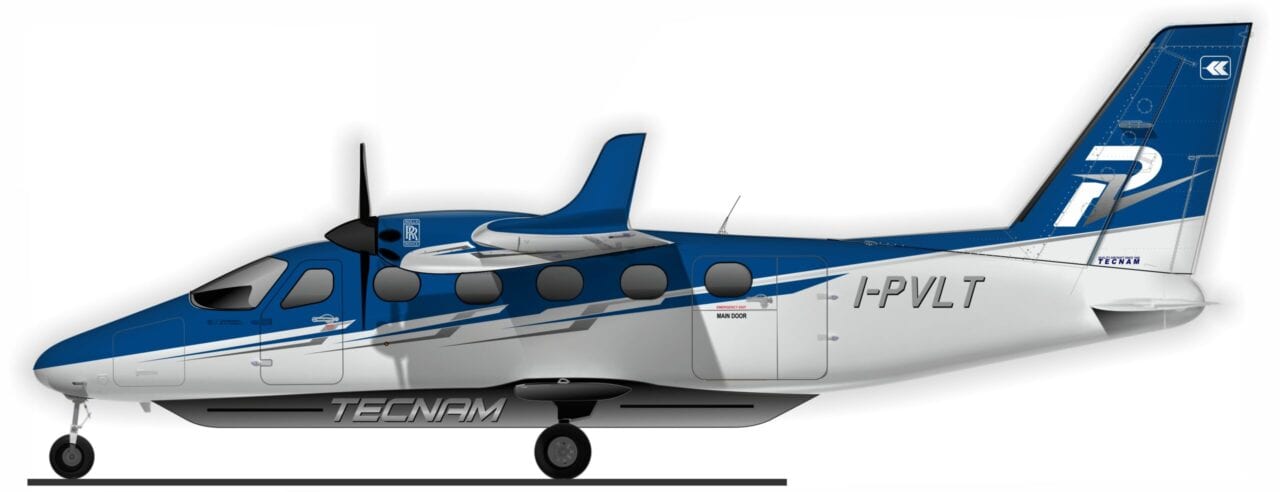
P-Volt is a nine-seater all-electric commuter aircraft being developed by Tecnam in partnership with Rolls-Royce. (Tecnam)
Capua, Italy-based general aviation aircraft maker Tecnam has partnered with Rolls-Royce to develop the P-Volt, an all-electric regional aircraft that the two manufacturers envision flying an assortment of different missions ranging from passenger operations to medical evacuation and cargo.
According to an Oct. 23 press release, Tecnam is also partnering with several “North American and European airlines” for the development of the P-Volt. Tecnam envisions P-Volt featuring enough seating capacity for up to nine passengers, with all-electric motors, avionics, heating, and air conditioning systems as well.
This is the second partnership established between Tecnam and Rolls Royce, as both are also currently working on the H3PS project, which is to feature the industry’s first parallel hybrid powertrain for a general aviation four-seater aircraft. Rolls Royce is providing the electric motor and storage for the H3PS project, which will be paired with a Rotax engine powered by conventional fuel.
“We all need to commit our efforts towards systems that contribute to decarbonization,” said Paolo Pascale Langer, Tecnam CEO said in a statement. “By combining efficiency and renewable energy into the futuristic propulsion system, we will not only reduce costs but also grant a greener future to our passion for flying.”
P-Volt will also borrow from some of the design elements of Tecnam’s P2012 Traveller twin-piston, which achieved the European Union Aviation Safety Agency (EASA) and Federal Aviation Administration (FAA) type certification last year prior to being delivered to U.S. launch customer Cape Air in October 2019. Cape Air, which plans to use 100 new P2012 Travellers to replace its fleet of Cessna 402s over the next decade, is also the launch customer for Eviation’s all-electric Alice commuter aircraft.
Tecnam’s partnership with Rolls Royce comes as other manufacturers continue to advance all-electric or hybrid-electric aircraft programs of their own. In June, Pipistrel’s two-seater Velis Electro achieved EASA type certification, the first electric aircraft in the world to do so. The trainer aircraft is powered by Pipistrel’s E-811-268MVLC electric engine, capable of flying up to 50 minutes with a maximum takeoff weight of 1,320 lbs.
Meanwhile, in the electric vertical takeoff and landing (eVTOL) world, EmbraerX also officially launched a new independent company, Eve, dedicated to developing the company’s first eVTOL aircraft in an Oct. 15 press release. German electric air taxi company Volocopter, is also ready to expand testing of its own Volocity eVTOL to Paris, according to a Sept. 30 press release.
No major systems or performance specifications were provided by Tecnam upon announcing its partnership with Rolls Royce, and the company has not yet released a timeline as to when the P-Volt will be ready for flight testing or certification.
“Dedicated battery technology will ensure full power availability for quick turnaround times between landing and take-off” on the P-Volt, according to Tecnam.
“Rolls-Royce is committed to delivering the electrification of flight and to support the de-carbonization of aviation,” Rob Watson, director of Rolls-Royce Electrical said in a statement. “This new partnership with Tecnam will strengthen our existing relationship, further developing both companies’ capabilities. We are delighted to work with all the partners on a program that has the potential to develop the technology to make a significant leap in the commuter market.”